Unit 2 It’s a nice day, isn’t it?Section A (3a-3c)基础知识必会清单及知识闯关(含答案)
文档属性
| 名称 | Unit 2 It’s a nice day, isn’t it?Section A (3a-3c)基础知识必会清单及知识闯关(含答案) |
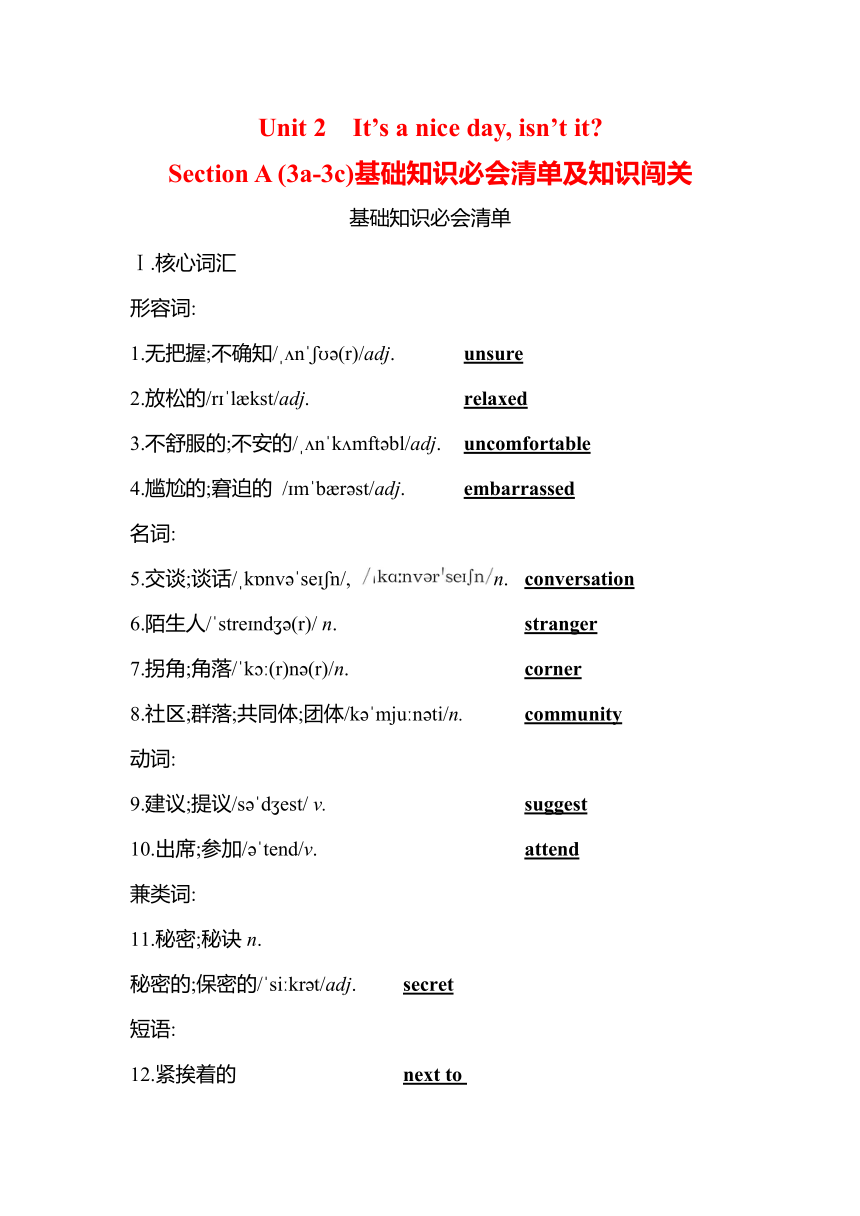
|
|
| 格式 | docx | ||
| 文件大小 | 350.9KB | ||
| 资源类型 | 教案 | ||
| 版本资源 | 鲁教版 | ||
| 科目 | 英语 | ||
| 更新时间 | 2024-02-07 09:37:30 | ||
图片预览

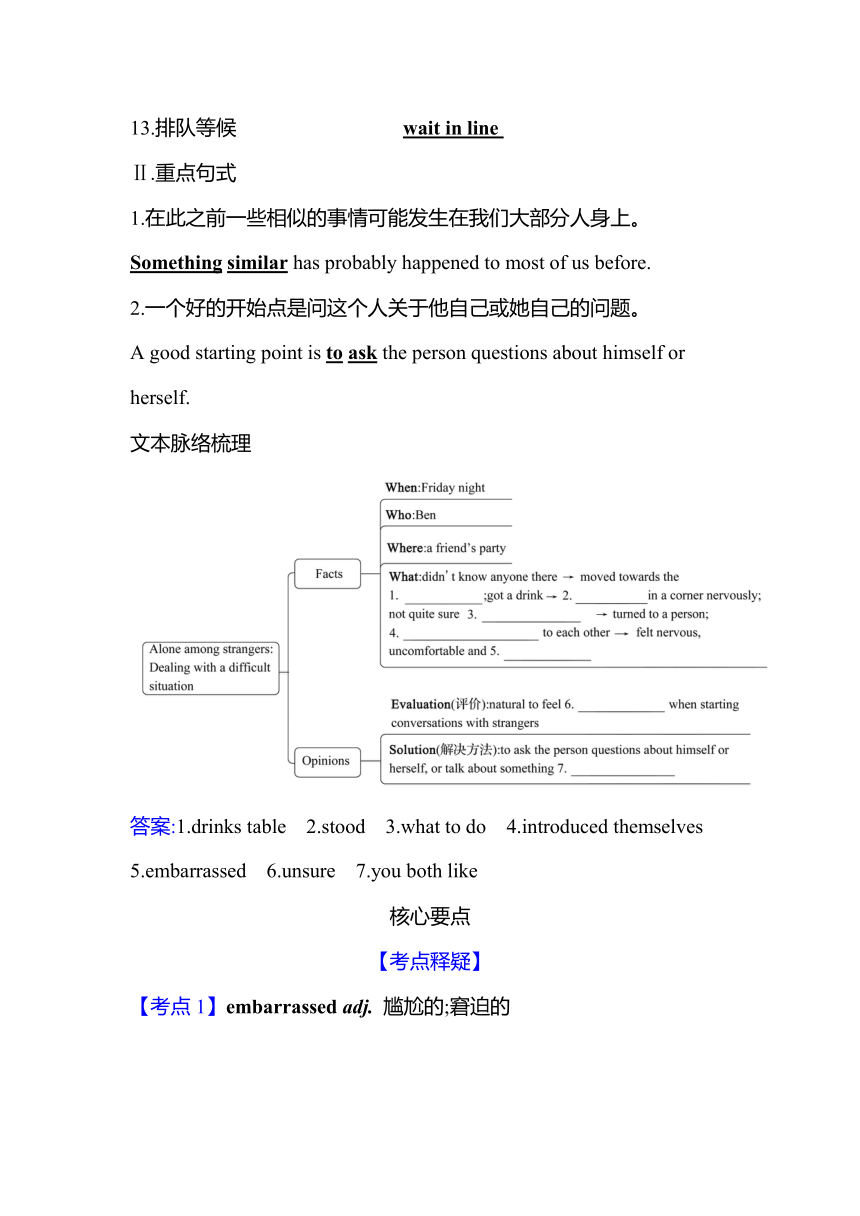
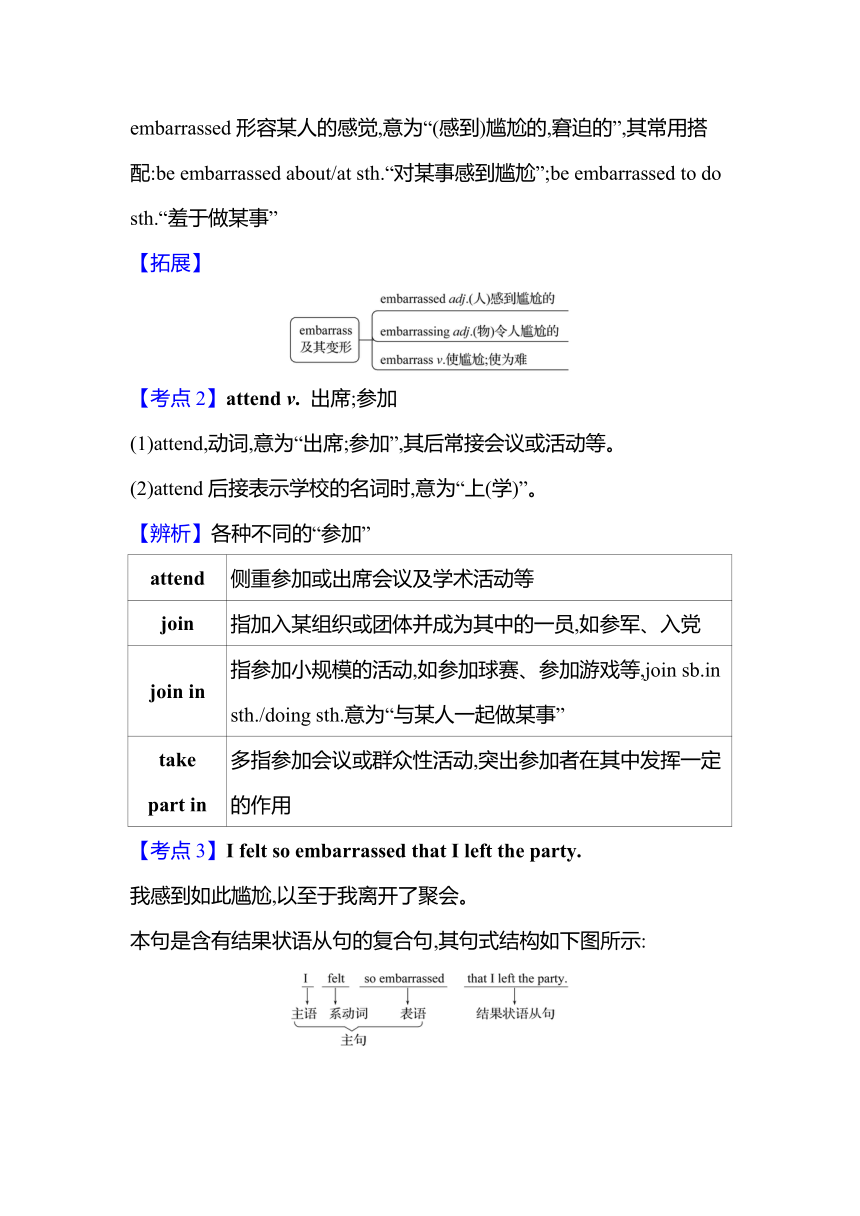
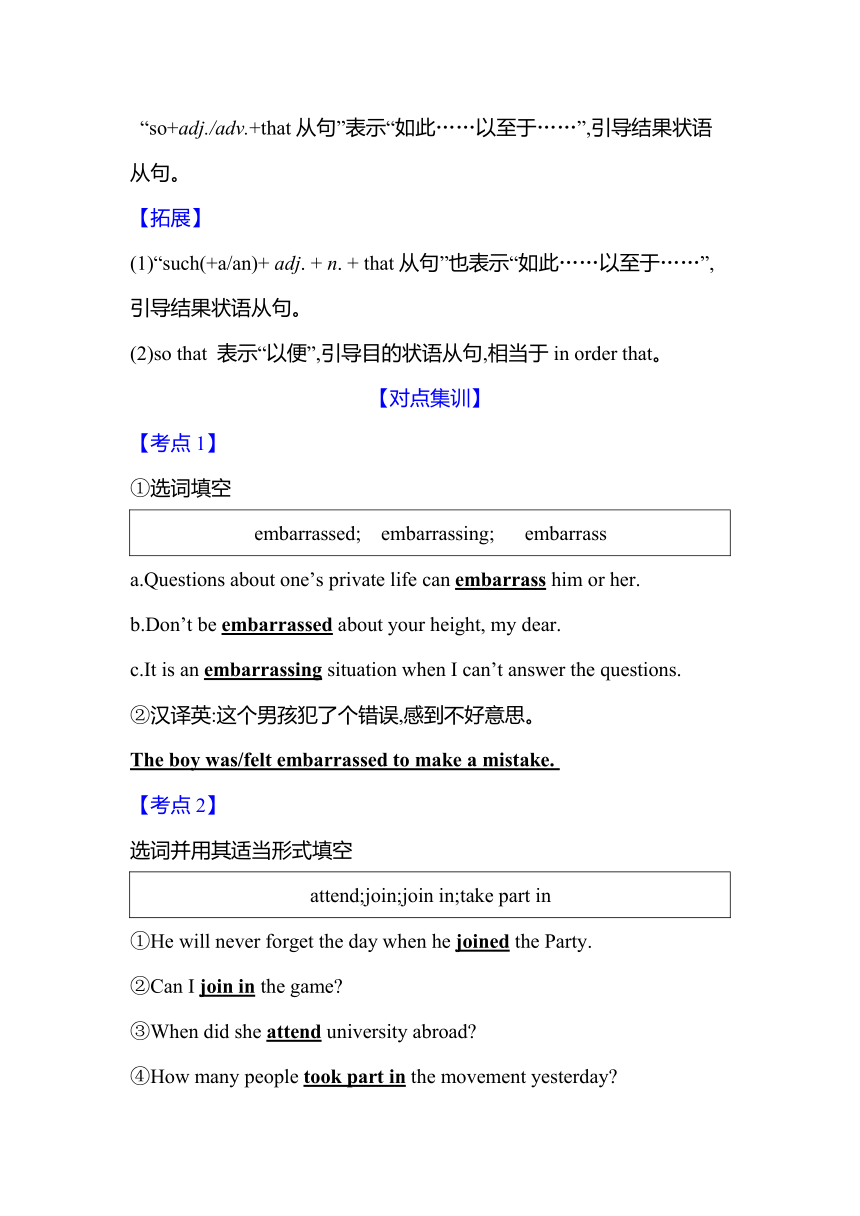
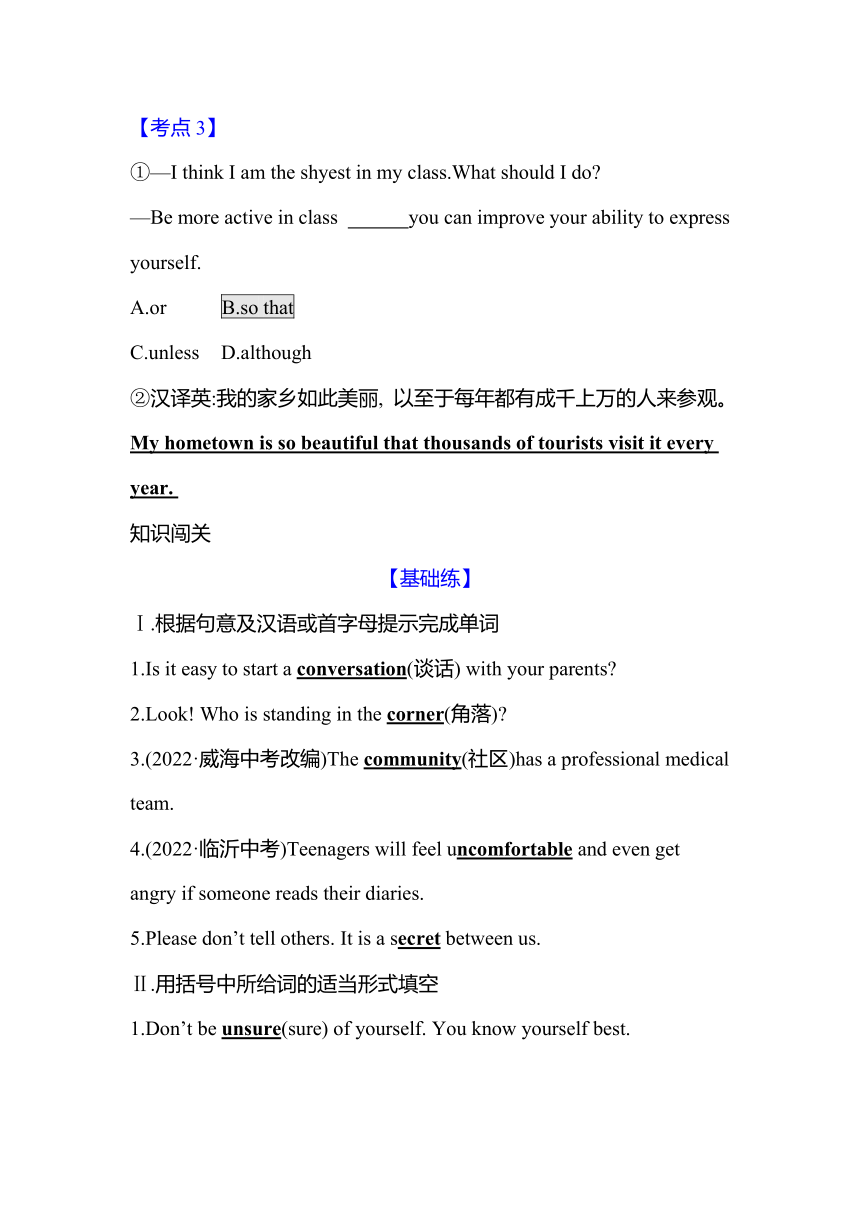
文档简介
Unit 2 It’s a nice day, isn’t it
Section A (3a-3c)基础知识必会清单及知识闯关
基础知识必会清单
Ⅰ.核心词汇
形容词:
1.无把握;不确知/ n (r)/adj. unsure
2.放松的/r l kst/adj. relaxed
3.不舒服的;不安的/ n k mft bl/adj. uncomfortable
4.尴尬的;窘迫的 / m b r st/adj. embarrassed
名词:
5.交谈;谈话/ k nv se n/, n. conversation
6.陌生人/ stre nd (r)/ n. stranger
7.拐角;角落/ k (r)n (r)/n. corner
8.社区;群落;共同体;团体/k mju n ti/n. community
动词:
9.建议;提议/s d est/ v. suggest
10.出席;参加/ tend/v. attend
兼类词:
11.秘密;秘诀n.
秘密的;保密的/ si kr t/adj. secret
短语:
12.紧挨着的 next to
13.排队等候 wait in line
Ⅱ.重点句式
1.在此之前一些相似的事情可能发生在我们大部分人身上。
Something similar has probably happened to most of us before.
2.一个好的开始点是问这个人关于他自己或她自己的问题。
A good starting point is to ask the person questions about himself or herself.
文本脉络梳理
答案:1.drinks table 2.stood 3.what to do 4.introduced themselves 5.embarrassed 6.unsure 7.you both like
核心要点
【考点释疑】
【考点1】embarrassed adj. 尴尬的;窘迫的
embarrassed形容某人的感觉,意为“(感到)尴尬的,窘迫的”,其常用搭配:be embarrassed about/at sth.“对某事感到尴尬”;be embarrassed to do sth.“羞于做某事”
【拓展】
【考点2】attend v. 出席;参加
(1)attend,动词,意为“出席;参加”,其后常接会议或活动等。
(2)attend后接表示学校的名词时,意为“上(学)”。
【辨析】各种不同的“参加”
attend 侧重参加或出席会议及学术活动等
join 指加入某组织或团体并成为其中的一员,如参军、入党
join in 指参加小规模的活动,如参加球赛、参加游戏等,join sb.in sth./doing sth.意为“与某人一起做某事”
take part in 多指参加会议或群众性活动,突出参加者在其中发挥一定的作用
【考点3】I felt so embarrassed that I left the party.
我感到如此尴尬,以至于我离开了聚会。
本句是含有结果状语从句的复合句,其句式结构如下图所示:
“so+adj./adv.+that从句”表示“如此……以至于……”,引导结果状语从句。
【拓展】
(1)“such(+a/an)+ adj. + n. + that从句”也表示“如此……以至于……”,引导结果状语从句。
(2)so that 表示“以便”,引导目的状语从句,相当于in order that。
【对点集训】
【考点1】
①选词填空
embarrassed; embarrassing; embarrass
a.Questions about one’s private life can embarrass him or her.
b.Don’t be embarrassed about your height, my dear.
c.It is an embarrassing situation when I can’t answer the questions.
②汉译英:这个男孩犯了个错误,感到不好意思。
The boy was/felt embarrassed to make a mistake.
【考点2】
选词并用其适当形式填空
attend;join;join in;take part in
①He will never forget the day when he joined the Party.
②Can I join in the game
③When did she attend university abroad
④How many people took part in the movement yesterday
【考点3】
①—I think I am the shyest in my class.What should I do
—Be more active in class you can improve your ability to express yourself.
A.or B.so that
C.unless D.although
②汉译英:我的家乡如此美丽, 以至于每年都有成千上万的人来参观。
My hometown is so beautiful that thousands of tourists visit it every year.
知识闯关
【基础练】
Ⅰ.根据句意及汉语或首字母提示完成单词
1.Is it easy to start a conversation(谈话) with your parents
2.Look! Who is standing in the corner(角落)
3.(2022·威海中考改编)The community(社区)has a professional medical team.
4.(2022·临沂中考)Teenagers will feel uncomfortable and even get angry if someone reads their diaries.
5.Please don’t tell others. It is a secret between us.
Ⅱ.用括号中所给词的适当形式填空
1.Don’t be unsure(sure) of yourself. You know yourself best.
2.The exam is coming but we should not be nervous. Just be relaxed(relax).
3.I offered to help my new classmate, but she refused me shyly(shy).
4.Our teacher always suggests watching(watch) English movies as often as possible.
5.I was quite embarrassed(embarrass) when I couldn’t hand in my homework on time.
6.After the exams, we were all waiting for the results nervously(nervous).
7.I heard someone singing (sing) in the room when I passed by.
8.Our parents and teachers always tell us not to talk with strangers(strange) in the street.
9.Mr Liu’s hobby is collecting (collect) stamps.
10.Why did the baby keep crying (cry)
Ⅲ.完成句子
1.我们的房子就是学校旁边的那座。
Our house is the one next to the school.
2.排队等候是很有礼貌的。
It’s good manners to wait in line.
3.我就是弄不清做什么才好。
I just don’t know what to do for the best.
4.琳达学习如此努力以至于她取得了好成绩。
Linda studied so hard that she got good grades.
5.谢谢你的建议和鼓励。
Thanks for your advice and encouragement.
【能力练】
Ⅳ.短文填空
根据短文内容,用方框中所给单词的适当形式填空,使文章通顺、完整。(每词限用一次)
think; talk; relax; embarrass; nervous; happen; I; ask; comfortable; but
Alone among strangers:Dealing with a difficult situation
It was Friday night and I attended a party. As I walked through the door, I could hear loud music and people 1.talking. My friend saw me and gave me a warm welcome. “Thanks for inviting me. It looks like a great party,” I said to him. 2.But I had a secret feeling of fear. I didn’t know anyone there. I 3.nervously stood in a corner, not quite sure what to do.
Finally, I turned to the person next to me and introduced 4.myself. The person introduced herself to me shyly. Then there was a long silence as I kept trying 5.to think about what to say next. I felt more and more nervous and the other person was looking 6.uncomfortable, too. In the end, all I could say was, “Well, it was nice meeting you,” and I quickly walked away. I felt so 7.embarrassed that I left the party.
Ben isn’t the only person that has experienced this situation. Perhaps something similar 8.has happened to most of us before. It’s natural to feel unsure of ourselves when starting conversations with strangers. A good starting point is 9.to ask the person questions about himself or herself, or talk about something you both like such as football or pop music. This can make social situations more 10.relaxed. Then you’ll be glad you went to the party.
Ⅴ.阅读理解
In most languages, people often start small talk after a greeting.Small talk means the little things we talk about at the start of a conversation.In English-speaking countries people often make small talk about the weather: “Nice day, isn’t it ” “Terrible weather, isn’t it ” But there is something special about small talk.It must be about something that both people have the same opinion about.The purpose(目的) of small talk is to let both people agree on something.This makes meeting people easier and more comfortable.People usually agree about the weather, so it is a safe topic for small talk.But people often disagree about religion(宗教) or politics(政治), so these are not suitable topics for small talk.The topics for small talk also depend on where the conversation takes place.At football matches, people make small talk about the game they are watching: “Great game, isn’t it ” At bus stops, people may comment about the transport system: “The bus service is terrible, isn’t it ”
Small talk is an important part of conversation in any language.People in different countries start small talk in different ways.This shows that when we learn a language, we should learn the vocabulary and the grammar as well as the social behavior of the people who speak it.
1.Small talk .
A.is a kind of conversation with short words
B.is a greeting when people meet each other
C.is to let people disagree about something
D.is a polite friendly conversation on unimportant topics
2.The favorite topic of small talk is about .
A.the weather B.politics
C.games D.languages
3.The passage suggests that when we learn a language, .
A.we should learn about the transport system of the country
B.we should only learn the grammar and the vocabulary
C.we should know the culture about the country
D.we should know the importance of the language
4.When we say “Great game, isn’t it ”, we in fact .
A.ask a question B.agree with the other
C.greet each other D.start small talk
5.What we learn from the passage is that .
A.different languages have different grammars
B.small talk is an important part in a language
C.small talk depends on the purpose of the conversation
D.we can talk about religion and politics in small talk
Section A (3a-3c)基础知识必会清单及知识闯关
基础知识必会清单
Ⅰ.核心词汇
形容词:
1.无把握;不确知/ n (r)/adj. unsure
2.放松的/r l kst/adj. relaxed
3.不舒服的;不安的/ n k mft bl/adj. uncomfortable
4.尴尬的;窘迫的 / m b r st/adj. embarrassed
名词:
5.交谈;谈话/ k nv se n/, n. conversation
6.陌生人/ stre nd (r)/ n. stranger
7.拐角;角落/ k (r)n (r)/n. corner
8.社区;群落;共同体;团体/k mju n ti/n. community
动词:
9.建议;提议/s d est/ v. suggest
10.出席;参加/ tend/v. attend
兼类词:
11.秘密;秘诀n.
秘密的;保密的/ si kr t/adj. secret
短语:
12.紧挨着的 next to
13.排队等候 wait in line
Ⅱ.重点句式
1.在此之前一些相似的事情可能发生在我们大部分人身上。
Something similar has probably happened to most of us before.
2.一个好的开始点是问这个人关于他自己或她自己的问题。
A good starting point is to ask the person questions about himself or herself.
文本脉络梳理
答案:1.drinks table 2.stood 3.what to do 4.introduced themselves 5.embarrassed 6.unsure 7.you both like
核心要点
【考点释疑】
【考点1】embarrassed adj. 尴尬的;窘迫的
embarrassed形容某人的感觉,意为“(感到)尴尬的,窘迫的”,其常用搭配:be embarrassed about/at sth.“对某事感到尴尬”;be embarrassed to do sth.“羞于做某事”
【拓展】
【考点2】attend v. 出席;参加
(1)attend,动词,意为“出席;参加”,其后常接会议或活动等。
(2)attend后接表示学校的名词时,意为“上(学)”。
【辨析】各种不同的“参加”
attend 侧重参加或出席会议及学术活动等
join 指加入某组织或团体并成为其中的一员,如参军、入党
join in 指参加小规模的活动,如参加球赛、参加游戏等,join sb.in sth./doing sth.意为“与某人一起做某事”
take part in 多指参加会议或群众性活动,突出参加者在其中发挥一定的作用
【考点3】I felt so embarrassed that I left the party.
我感到如此尴尬,以至于我离开了聚会。
本句是含有结果状语从句的复合句,其句式结构如下图所示:
“so+adj./adv.+that从句”表示“如此……以至于……”,引导结果状语从句。
【拓展】
(1)“such(+a/an)+ adj. + n. + that从句”也表示“如此……以至于……”,引导结果状语从句。
(2)so that 表示“以便”,引导目的状语从句,相当于in order that。
【对点集训】
【考点1】
①选词填空
embarrassed; embarrassing; embarrass
a.Questions about one’s private life can embarrass him or her.
b.Don’t be embarrassed about your height, my dear.
c.It is an embarrassing situation when I can’t answer the questions.
②汉译英:这个男孩犯了个错误,感到不好意思。
The boy was/felt embarrassed to make a mistake.
【考点2】
选词并用其适当形式填空
attend;join;join in;take part in
①He will never forget the day when he joined the Party.
②Can I join in the game
③When did she attend university abroad
④How many people took part in the movement yesterday
【考点3】
①—I think I am the shyest in my class.What should I do
—Be more active in class you can improve your ability to express yourself.
A.or B.so that
C.unless D.although
②汉译英:我的家乡如此美丽, 以至于每年都有成千上万的人来参观。
My hometown is so beautiful that thousands of tourists visit it every year.
知识闯关
【基础练】
Ⅰ.根据句意及汉语或首字母提示完成单词
1.Is it easy to start a conversation(谈话) with your parents
2.Look! Who is standing in the corner(角落)
3.(2022·威海中考改编)The community(社区)has a professional medical team.
4.(2022·临沂中考)Teenagers will feel uncomfortable and even get angry if someone reads their diaries.
5.Please don’t tell others. It is a secret between us.
Ⅱ.用括号中所给词的适当形式填空
1.Don’t be unsure(sure) of yourself. You know yourself best.
2.The exam is coming but we should not be nervous. Just be relaxed(relax).
3.I offered to help my new classmate, but she refused me shyly(shy).
4.Our teacher always suggests watching(watch) English movies as often as possible.
5.I was quite embarrassed(embarrass) when I couldn’t hand in my homework on time.
6.After the exams, we were all waiting for the results nervously(nervous).
7.I heard someone singing (sing) in the room when I passed by.
8.Our parents and teachers always tell us not to talk with strangers(strange) in the street.
9.Mr Liu’s hobby is collecting (collect) stamps.
10.Why did the baby keep crying (cry)
Ⅲ.完成句子
1.我们的房子就是学校旁边的那座。
Our house is the one next to the school.
2.排队等候是很有礼貌的。
It’s good manners to wait in line.
3.我就是弄不清做什么才好。
I just don’t know what to do for the best.
4.琳达学习如此努力以至于她取得了好成绩。
Linda studied so hard that she got good grades.
5.谢谢你的建议和鼓励。
Thanks for your advice and encouragement.
【能力练】
Ⅳ.短文填空
根据短文内容,用方框中所给单词的适当形式填空,使文章通顺、完整。(每词限用一次)
think; talk; relax; embarrass; nervous; happen; I; ask; comfortable; but
Alone among strangers:Dealing with a difficult situation
It was Friday night and I attended a party. As I walked through the door, I could hear loud music and people 1.talking. My friend saw me and gave me a warm welcome. “Thanks for inviting me. It looks like a great party,” I said to him. 2.But I had a secret feeling of fear. I didn’t know anyone there. I 3.nervously stood in a corner, not quite sure what to do.
Finally, I turned to the person next to me and introduced 4.myself. The person introduced herself to me shyly. Then there was a long silence as I kept trying 5.to think about what to say next. I felt more and more nervous and the other person was looking 6.uncomfortable, too. In the end, all I could say was, “Well, it was nice meeting you,” and I quickly walked away. I felt so 7.embarrassed that I left the party.
Ben isn’t the only person that has experienced this situation. Perhaps something similar 8.has happened to most of us before. It’s natural to feel unsure of ourselves when starting conversations with strangers. A good starting point is 9.to ask the person questions about himself or herself, or talk about something you both like such as football or pop music. This can make social situations more 10.relaxed. Then you’ll be glad you went to the party.
Ⅴ.阅读理解
In most languages, people often start small talk after a greeting.Small talk means the little things we talk about at the start of a conversation.In English-speaking countries people often make small talk about the weather: “Nice day, isn’t it ” “Terrible weather, isn’t it ” But there is something special about small talk.It must be about something that both people have the same opinion about.The purpose(目的) of small talk is to let both people agree on something.This makes meeting people easier and more comfortable.People usually agree about the weather, so it is a safe topic for small talk.But people often disagree about religion(宗教) or politics(政治), so these are not suitable topics for small talk.The topics for small talk also depend on where the conversation takes place.At football matches, people make small talk about the game they are watching: “Great game, isn’t it ” At bus stops, people may comment about the transport system: “The bus service is terrible, isn’t it ”
Small talk is an important part of conversation in any language.People in different countries start small talk in different ways.This shows that when we learn a language, we should learn the vocabulary and the grammar as well as the social behavior of the people who speak it.
1.Small talk .
A.is a kind of conversation with short words
B.is a greeting when people meet each other
C.is to let people disagree about something
D.is a polite friendly conversation on unimportant topics
2.The favorite topic of small talk is about .
A.the weather B.politics
C.games D.languages
3.The passage suggests that when we learn a language, .
A.we should learn about the transport system of the country
B.we should only learn the grammar and the vocabulary
C.we should know the culture about the country
D.we should know the importance of the language
4.When we say “Great game, isn’t it ”, we in fact .
A.ask a question B.agree with the other
C.greet each other D.start small talk
5.What we learn from the passage is that .
A.different languages have different grammars
B.small talk is an important part in a language
C.small talk depends on the purpose of the conversation
D.we can talk about religion and politics in small talk
同课章节目录
- Unit 1 When was heborn?
- Section A
- Section B
- Unit 2 It's a nice day, isn't it?
- Section A
- Section B
- Unit 3 Where would you like to visit?
- Section A
- Section B
- Unit 4 How can we become good learners?
- Section A
- Section B
- Unit 5 I think that mooncakes are delicious!
- Section A
- Section B
- Unit 6 Could you please tell me where the restroom
- Section A
- Section B
- Unit 7 I used to be afraid of the dark.
- Section A
- Section B
- Unit 8 What are the shirts made of?
- Section A
- Section B
